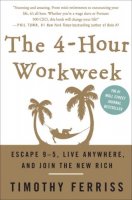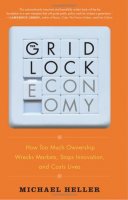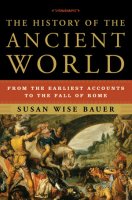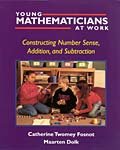 The 4-Hour Workweek: Escape 9 - 5, Live Anywhere, and Join the New Rich, by Timothy Ferriss (Crown Publishers, New York, 2007)
The 4-Hour Workweek: Escape 9 - 5, Live Anywhere, and Join the New Rich, by Timothy Ferriss (Crown Publishers, New York, 2007)
— Arabian Proverb
I discovered this proverb recently, and it goes well with my own, "The wise man recognizes truth in the words of his enemies," which I use to remind myself that there may be much to learn from people with whom I disagree, even on critical issues.
Janet found Tim Ferriss online. I found some of his ideas familiar—I think I read something about him, or watched someone's posted YouTube video from him...or something. (This is the problem with information glut. I used to be able to tell you, not only the book where I found certain information, but often the section of the page. No more. Did I read it in a book? On a blog? See it on YouTube? Hear it on the radio? I have no idea.)
It would be easy to be turned off by Tim Ferriss. He comes across as brash, self-centered, bombastic, and as subtle as an infomercial, and I'm certain his moral compass points several degrees shy of north.* But to ignore him on that basis would be a mistake. In amongst the infomercial fodder there is some truth, and some really good ideas. (More)God Grew Tired of Us (Newmarket Films, 2006)
Subtitled The Story of the Lost Boys of Sudan, this award-winning, PG-rated film tells the stories of three Sudanese men who, as chldren, fled the genocide in their country, walked over a thousand miles through difficult terrain and terrible deprivation, first to Ethiopia and finally to a refugee camp in Kenya. After many years in the camp, they were brought to the United States to live.
Steering clear, for the most part, of political issues, the film is simultaneously horrifying, inspiring, and even funny, such as the time one of the boys picked up a bottle of Pepsi and proclaimed, "In Africa we call this Coca-Cola." I'm sure the Coke folks loved that. Two of the boys were resettled in Pittsburgh, so there are some fun shots for Pittsburgers, including one of the good ol' 86B bus. One of the boys—now men—works at Whole Foods, so it's possible I might even have seen him. (More)(I'll be including some links in this post, but follow them with care if you think there's a chance you'll want to watch the movies, as they contain spoilers.)
Our church periodically holds "communication" classes, mostly designed for couples, although the tools and techniques we discuss are applicable for all relationships, so I wish it was more widely advertised. Be that as it may, most of us find ourselves signing up again and again, not so much for the content as for an excuse and a framework for spending time together.
In the most recent incarnation of the class, we began with watching the movie, Fireproof, and are working our way through The Love Dare book, which is featured in the movie. Although it has some good points, I can't say as I've found the book all that useful, but the movie was great. It was so enjoyable we hastened to put the company's previous film, Facing the Giants, high on our Netflix queue. While not quite as well-made as Fireproof, it is still excellent—take note that I thoroughly enjoyed watching a movie about football! (More)I know—the last thing you need is another blog to read! And the one I’m about to recommend had several authors and consequently great risk of overwhelming your feed reader. Especially since nearly all the posts are thought-provoking and well-written.
The Front Porch Republic is new—the first posts were on March 2 of this year—but has already produced so many shareable articles that it deserves its own post. Treat yourself and subscribe to the Front Porch Republic; they have a Comments RSS feed as well, though I can’t usually keep up with it. A mark of the quality of this blog (and its readers) is that the comments are so far above the “Your a &%$#& moron!” level seen all too often on websites without benefit of sufficient editorial oversight. (More)
Permalink | Read 2649 times | Comments (2)
Category Reviews: [first] [previous] [next] [newest] Politics: [first] [previous] [next] [newest] Random Musings: [first] [previous] [next] [newest] Conservationist Living: [first] [previous] [next] [newest]
Declining by Degrees: Higher Education at Risk premiered on PBS in 2005; I watched it for the first time this week, intrigued by this Netflix summary.
Debunking commonly held notions about the rite of passage known as the college experience, this PBS documentary follows 30 students and their teachers along the path of higher education, from admission to graduation, and exposes the disappointment, disorientation and deflation many students feel—in both public and private schools. This revealing study also addresses the quality and readiness of America's future work force.
"Disappointment, disorientation, and deflation" fairly describes how I felt watching the show. Here's what I learned: (More)
 The Gridlock Economy, by Michael Heller (Basic Books, New York, 2008)
The Gridlock Economy, by Michael Heller (Basic Books, New York, 2008)
Peter V.—who now keeps most of his insightful commentary behind the Facebook wall, so I can't provide a link—alerted me to The Gridlock Economy, which I touched on in the first Casting the Net. Since then I obtained the book through Interlibrary Loan, and thanks to my Lenten disciplines, finished reading it last night. Now I can get the library monkey off my back and return this long-overdue book. (To be fair to them, the library has not been nagging me about it. But I was brought up to view an overdue library book as an unpaid debt, and my own conscience does quite enough nagging. In maturity—I think once I passed the half-century mark—I came to realize that keeping a book a little longer and paying a fine was an acceptable strategy and more reasonable than returning it unfinished. But I still imagine that I'm keeping hoards of folks in durance vile by limiting their access to the book.) (More)
I briefly reviewed the wonderful Claude Moore Colonial Farm back in 2005. It's time for an update, because there's a great article about the place and its people on Slate. Don't miss the video, which I can't figure out how to imbed here since it's not YouTube or a similar site.
The usual disclaimers, I don't usually do "memes," etc. But when it's books, it's hard to resist. I found this one over at Percival Blakeney Academy. The instructions are:
- Look at the list and bold those you have read—films don't count.
- Italicize those you intend to read. ("Intend" may be a little strong. How about "Would like to read someday, sometime.)
- Tag somebody if you like. (I don’t like to tag people. But I’d love to see other people’s lists and comments.)
I don't know who chose the books on the list, nor why. It seems varied enough, with books old and new, and several I've never heard of. And any book list that includes Swallows and Amazons gets big points as far as I'm concerned. It could only have done better by including George MacDonald. :) My comments follow in parentheses. (More)
Permalink | Read 7508 times | Comments (26)
Category Reviews: [first] [previous] [next] [newest] Education: [first] [previous] [next] [newest] Random Musings: [first] [previous] [next] [newest] Just for Fun: [first] [previous] [next] [newest]
What do you expect to find in a public library? I would like—though no longer expect—to find a large selection of old, unusual, and out-of-print books, music, and videos, the kind I am unable to buy from Amazon or borrow from Netflix. Shouldn't that be a basic purpose of libraries: to be a treasure store of valuable materials outside of whatever happens to be popular at the moment, especially those not otherwise easily obtainable? Unfortunately, most libraries seem to be divesting themselves of these materials in order to make more room for the the latest favorites. To be sure, this is also a function of libraries, and I appreciate being able to borrow a book when all I want to do is read it; I prefer stocking our own bookshelves with materials I already know are worthwhile. (One casualty of the libraries' jettisoning old books is that our shelves are overflowing; I can no longer prune our collection of lesser books on the grounds that I can always borrow them from the library if needed.) Most libraries, I believe, are out of balance in the way they address both functions, and our culture is suffering for it.
Thanks to my sister-in-law, who should have her own blog because she and my brother send me interesting ideas much faster than I can write about them, and to the Percival Blakeney Academy blog, I now know that this phenomenon is not limited to libraries, but has had a major impact on the Oxford University Press Junior Dictionary. (More)Heather and Jon gave us a gift certificate for the El Bodegon restaurant, because they know we've been mouring the demise of our favorite tapas restaurant. We thought we'd celebrate our anniversary again tonight (the first celebration having been in Switzerland) and try it out.
Our intentions to use the gift certificate went by the board, however. We arrived during tapas happy hour, and learned that we couldn't use both discounts. We couldn't resist two-for-one tapas, so we'll need to return to use the gift certificate. This is a good thing. :) The meal was thoroughly delightful: (More)
 The History of the Ancient World: From the Earliest Accounts to the Fall of Rome, by Susan Wise Bauer (W. W. Norton, New York, 2007)
The History of the Ancient World: From the Earliest Accounts to the Fall of Rome, by Susan Wise Bauer (W. W. Norton, New York, 2007)
Despite having some initial negative reactions to Susan Wise Bauer, I've continued to find her work delightful and invaluable. (See my reviews of The Well-Trained Mind, The Story of the World, and The Well-Educated Mind.) I haven't read more than a small part of The History of the Ancient World, but borrowed it from the library in order to determine whether or not to buy it for myself. I've so enjoyed—and learned from—listening to Jim Weiss read The Story of the World, which was written for elementary-age children, that I wondered if Bauer could bring as much delight into a history book for adults.
Time does not permit me to read through the book, much less review it properly, but let's just say I wish I didn't have to take it back to the library as soon as possible to remove temptation. The History of the Ancient World is delightful to read. Much of the delight, I think, comes from the philosophy of her approach, which she explains much better in the introduction than I have time to write, or even to copy, here. Bauer is interested in people: their lives, thoughts, fears, hopes, dreams, actions, and relationships. She minimizes the general and the theoretical in favor of the personal, and includes the myths and stories of a culture as well as verifiable facts. The stories that have come down with a people from before recorded time should inform our historical speculations as much as potsherds from an archeological dig.
This approach no doubt will anger many, some because she finds historical value in passages from the Bible, and others because she gives similar respect to the ancient stories of other cultures. To me, it makes for great story-telling. The History of the Ancient World has earned a place on my wish list, perhaps for the next time Borders offers me a 40% off coupon, and I certainly hope Susan Wise Bauer is working on a sequel.
 Young Mathematicians at Work: Constructing Number Sense, Addition, and Subtraction, by Catherine Twomey Fosnott and Maarten Dolk (Heinemann, Portsmouth, NY, 2001)
Young Mathematicians at Work: Constructing Number Sense, Addition, and Subtraction, by Catherine Twomey Fosnott and Maarten Dolk (Heinemann, Portsmouth, NY, 2001)
I must return this book to the library today, and I don't have time to finish reading it, but nonethless it deserves mention. This joint effort of American and Dutch mathematics educators is often repetitive and sometimes wearisome to read, but includes ideas well worth exploring by anyone desiring to teach, or to learn, mathematics at its most basic levels. Their strategies for encouraging children to think mathematically are aimed at classrooom teachers—and show, incidentally, some of the advantages of group instruction—but many should be adaptable to home education as well.
When I learned of this book I had intended to order it as a Christmas present for our grandkids. (I know what you're thinking—such an odd grandmother!) However, while it is a great book to learn from, it's not that exciting a book to own. So do what I did, and turn to your favorite library—Interlibrary Loan, if necessary.Yesterday we capped a busy day (at church till mid-afternoon for a special event, followed by—oh, joy!—flu shots) with our second Orlando Philharmonic Orchestra concert of the year. I'm greatly enjoying Chris Wilkins' approach to concert programming: he chooses a good blend of old and new, familiar and unknown, comfortable and challenging. Well, just barely challenging, but that's okay; I prefer my musical challenges on a smaller scale and with explanation, as with Bernard Rands' Memo 8, which came to mind when I was pondering "challenging." That was one of my favorite Eastman concert experiences, and I would love to hear it performed again, but I don't see that happening; even a Google search nets little, and my favorite oboist has gone Medieval—not that I mind that! Ah, well—I have my recording. But I digress greatly.
Last night's concert showed Wilkins' programming strengths and his willingness to venture into non-traditional concert territory. The theme was Abraham Lincoln, and the program a collaboration with the Orange County History Center. (More)I love to cook, but that's something I keep forgetting. Maybe I need an audience; it hardly seems worth the time and effort when I'm eating alone, and even when I'm not we're usually so busy it hardly seems reasonable to spend much time cooking. But Porter keeps talking about how this is the best restaurant in town, so it seems only fair to work towards making that a reality. On Saturday, we had some of our favorite company over for dinner—the best kind to cook for, because they're always appreciative and don't mind being guinea pigs for whatever I want to try out.
Earlier this summer, my nephew had feasted us on Hazelnut-Crusted Chicken with Raspberry Sauce, a Bon Appétit recipe from Epicurious.com. The taste was even more amazing than this beautiful presentation (click on picture for larger view):
It was a recipe I knew I had to add to my repertoire, so that's what I served. Sort of. Well, actually, that was the starting point, but I never can resist changing things along the way. One of our guests doesn't eat meat, so I used salmon instead of chicken. I had the store take the skin off the filet, then sliced it into pieces about two inches wide. I could have bought hazelnuts, but had pecans in stock, and I used raspberry balsamic vinegar instead of white wine vinegar, canola oil instead of safflower, Cherchies' Champagne Mustard instead of honey mustard, Penzeys' Florida Seasoned Pepper for half the black pepper—you get the picture. And because it was fish, I baked it for about 20 minutes instead of frying it first.
Despite all the changes, the end result was still really, really good. I'm going to go raid the leftovers now....
I've never been to the Blue Ribbon Tavern in Grove City, so this isn't really a review, despite the category. But I hope to get there someday, and since it sits nearly at the intersection of I-80 and I-79 in Pennsylvania, it's likely I will. Taverns aren't at the top of my list of places to visit, but this one eliminates a huge potential problem by not allowing smoking on the inside. (Not that they necessarily get credit for that, since I believe it's Pennsylvania law.) However, this one has a few special attractions. (More)



